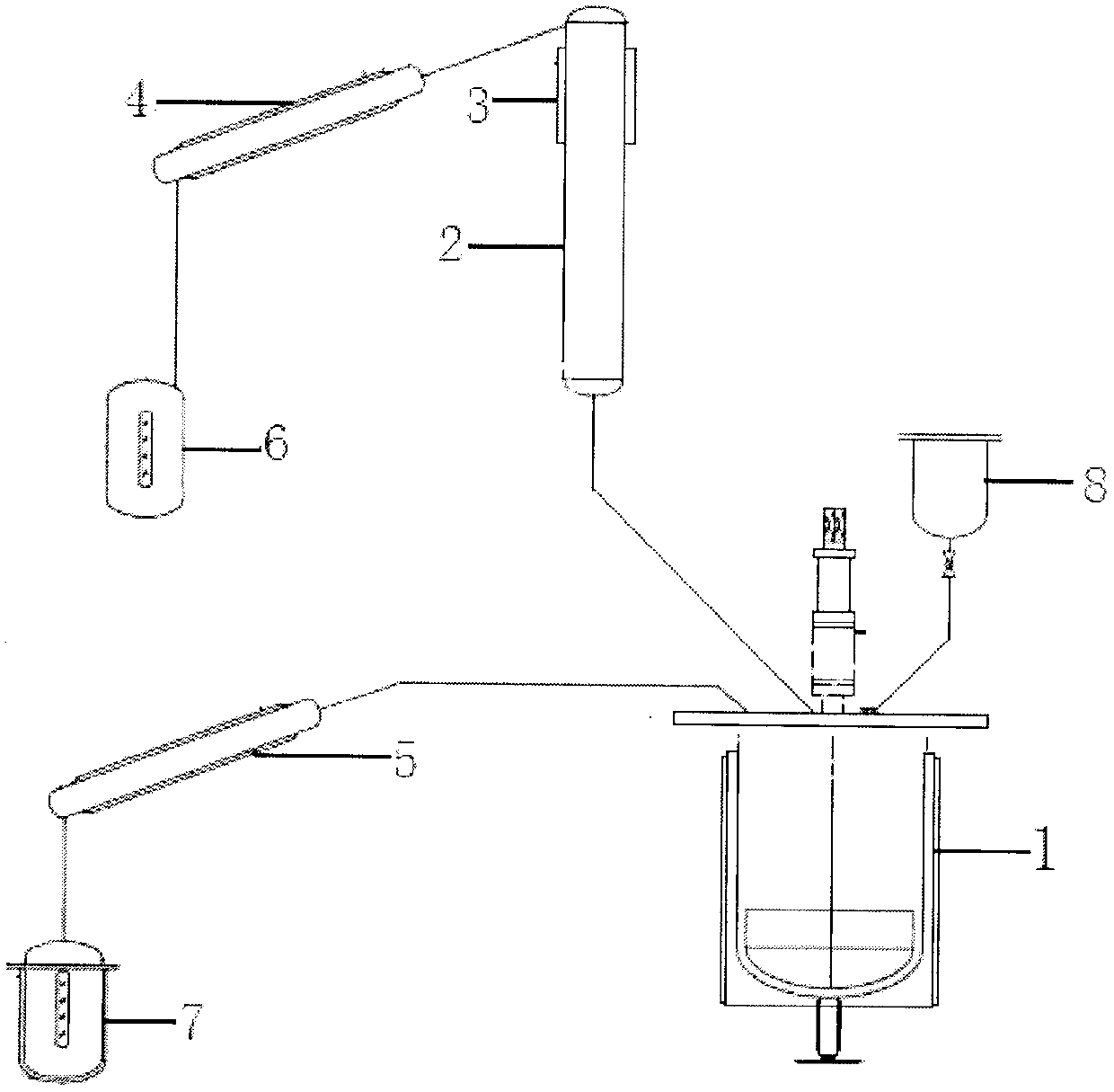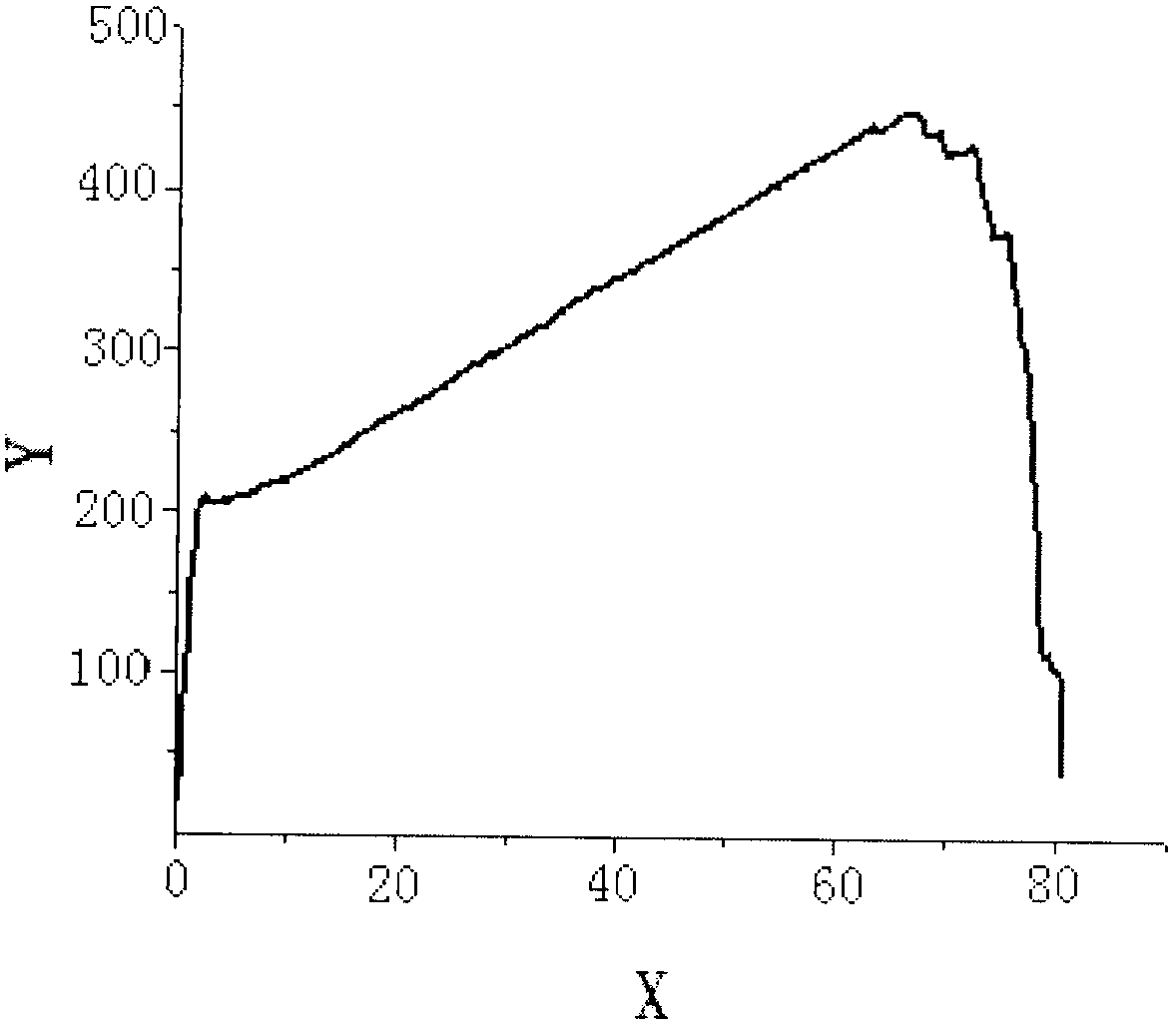Regeneration base cation colorable polyester filament yarn and preparation method thereof
A technology of polyester filament and recycled polyester, applied in rayon manufacturing, single-component polyester rayon, fiber chemical characteristics, etc., can solve problems such as environmental pollution and oil resource depletion, and achieve reduction of environmental pollution and dyeing performance Excellent, slowing effect of energy depletion
- Summary
- Abstract
- Description
- Claims
- Application Information
AI Technical Summary
Problems solved by technology
Method used
Image
Examples
Embodiment 1
[0027] in such as figure 1 In the reaction kettle 1 shown in the reaction flow diagram, waste polyester bottle flakes and ethylene glycol are put into the reactor 1 in a molar ratio of 1:1, and antimony trioxide and 50 ppm of antimony trioxide and 50 ppm of polyester waste mass ratio are added into the polyester waste. Zinc acetate composite catalyst for depolymerization reaction, control the BHET product to be more than 50% until the end of the reaction, control the temperature at 230°C and add monoglycol isophthalate with a mass ratio of 50% of 1% of the total mass of polyester - 5-sodium sulfonate ethylene glycol slurry, add 3wt% adipic acid and 50ppm antioxidant 1010, react for 60 minutes, carry out vacuum polycondensation, polymerize into cationic dyeable recycled polyester, after polycondensation reaction Pelletize, dry, and spin at 290°C to obtain cationic dyeable recycled polyester filaments.
Embodiment 2
[0029] in such as figure 1 In the reactor 1 shown in the reaction flow chart, the waste polyester material and ethylene glycol are put into the reactor 1 in a molar ratio of 1:3, and ethylene glycol antimony and 50 ppm acetic acid are added in a mass ratio of 500 ppm to the polyester waste. The zinc composite catalyst carries out the depolymerization reaction, and the BHET product is controlled to be more than 90% until the end of the reaction, and the temperature is controlled at 250° C. to add 20% isophthalic acid monoglycol ester-5- Sodium sulfonate ethylene glycol slurry, 7% isophthalic acid and 100ppm antioxidant 168, reacted for 30 minutes, then vacuum polycondensed, polymerized into cationic dyeable recycled polyester melt, cationic dyeable recycled polyester The ester melt is spun at 285° C. in a direct melt spinning equipment to obtain cationic dyeable recycled polyester filaments.
Embodiment 3
[0031] in such as figure 1 In the reaction kettle 1 shown in the reaction flow diagram, waste polyester fiber and ethylene glycol are put into the reactor 1 in a molar ratio of 1:6, and the addition of 300ppm of n-butyl peptide and 100ppm of Zinc acetate composite catalyst for depolymerization reaction, control the BHET product to be more than 80% until the end of the reaction, control the temperature at 260°C and add monoglycol isophthalate-5 with a concentration of 30% of the total polyester content of 3% -Sodium sulfonate ethylene glycol slurry, 1wt% adipic acid, 3wt% isophthalic acid and 200ppm antioxidant 1010, after reacting for 50 minutes, carry out vacuum condensation polymerization, and polymerize into cationic dyeable recycled polyester melt , The cationic dyeable recycled polyester melt is spun at 280°C in direct melt spinning equipment, and the cationic dyeable recycled polyester filament with a fineness of 76dex / 36f is obtained through a winding speed of 3000m / s. ...
PUM
| Property | Measurement | Unit |
|---|---|---|
| color fastness | aaaaa | aaaaa |
Abstract
Description
Claims
Application Information
 Login to View More
Login to View More - R&D
- Intellectual Property
- Life Sciences
- Materials
- Tech Scout
- Unparalleled Data Quality
- Higher Quality Content
- 60% Fewer Hallucinations
Browse by: Latest US Patents, China's latest patents, Technical Efficacy Thesaurus, Application Domain, Technology Topic, Popular Technical Reports.
© 2025 PatSnap. All rights reserved.Legal|Privacy policy|Modern Slavery Act Transparency Statement|Sitemap|About US| Contact US: help@patsnap.com


